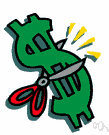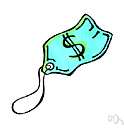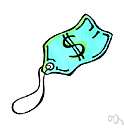cost
(kôst)cost
(kɒst)cost
(kɔst, kɒst)n., v. cost, for 11-13, cost•ed, cost•ing. n.
cost
- Something that costs a particular amount literally "stands at or with" that price, from Latin constare, "to be settled or fixed, stand at a price, cost."Cost
See Also: ADVANTAGEOUSNESS, THRIFT
- As cheap as pearls are costly —Robert Browning
- Charge like a brain surgeon —Saul Bellow
- Cheap as dirt —F. E. Smedley
- Cheap as excuses —Anon
- Cheap as lies —William Shakespeare
- Cheap as old clothes —Horace Walpole
- Cheap as old clothes used to be —Elyse Sommer
An update of Horace Walpole’s simile above, inspired by a change in both economic conditions and the upgraded status of old clothes.
- Expensive as building an atomic reactor —Robert Traver
- Expensive as Manhattan real estate —Anon
- Expensive as sin —Anon
Cost
(See also PAYMENT.)
an arm and a leg An exorbitant amount of money; a popular American hyperbole.
bleed See EXTORTION.
for a song Cheaply, inexpensively, at low cost, for little or nothing. A song meaning ‘a trifle or thing of no consequence’ may stem from the supposed retort of Baron Burleigh on being ordered by Elizabeth I to give Edmund Spenser an annuity of 100 pounds for having composed the Faerie Queene:
All this for a song?
In any event, a song as an insignificance dates from Elizabethan times, for Shakespeare uses it in this sense in All’s Well That Ends Well (1601).
for love or money At any price; by any means available. This phrase is most frequently used in the negative expression not for love or money to imply that someone or something is unobtainable at any price—either financial or emotional.
He let me … use … Anglo-Saxon texts not elsewhere to be had for love or money. (Francis March, A Comparative Grammar of the Anglo-Saxon Language, 1870)
highway robbery Exorbitantly or outrageously high prices. The allusion is to highwaymen, the holdup men of yesteryear who roamed the public roads robbing travelers. This expression is often used to express indignation at ridiculously high prices which one is nevertheless forced to pay for lack of an alternative, just as the victims of highwaymen had no choice but to surrender their money and goods at the risk of their lives. The expression has been in figurative use since at least 1920.
Nothing on the wine list … under two-pound-ten. Highway robbery by candlelight. (J. B. Priestley, It’s Old Country, 1967)
pay through the nose To pay an exorbitant price, financially or otherwise, unwittingly or through coercion. Many variations on one story line are cited as sources for this expression. The most popular is that the Danes in the 9th century imposed a “nose tax” on the Irish. Those who neglected to pay were punished by having their noses slit. Some say the Swedes or Norwegians were the oppressors. Others say the Jews rather than the Irish were the oppressed. However, pay through the nose derives from the punishment, irrespective of who inflicted the punishment on whom. The phrase was used as early as 1672 and is commonly heard today, often implying an unawareness or naiveté on the part of the person “paying through the nose.”
pay too dearly for one’s whistle To pay more for some desired object than it is worth; to expend a great deal of time, effort, or money for something which does not come up to one’s expectations; to indulge a whim. This expression is based on Benjamin Franklin’s The Whistle (1799), which tells of his nephew’s wanting a certain whistle so much that he paid its owner four times its value. As soon as the whistle had been acquired, however, it lost its appeal of the unattainable, leaving the boy disappointed with his purchase.
If a man likes to do it he must pay for his whistle. (George Eliot, Daniel Deronda, 1876)
price
– costThe price or cost of something is the amount of money you must pay to buy it.
You can also use cost to refer to the amount of money needed to do or make something.
Be Careful!
Don't use 'price' in this way. Don't say, for example, 'The price of raising a child is very high.'
You use the plural noun costs when you are referring to the total amount of money needed to run something such as a business.
You use cost as a verb to talk about the amount of money that you must pay for something.
You can use cost with two objects to say how much money someone pays for something on a particular occasion. The past tense and -ed participle of cost is cost.
Be Careful!
Don't use 'to' after cost in a sentence like this. Don't say, for example, 'How much did that haircut cost to you?'
cost
Past participle: cost/costed
Gerund: costing
| Imperative |
|---|
| cost |
| cost |
| Noun | 1. |  cost - the total spent for goods or services including money and time and labor cost - the total spent for goods or services including money and time and labordisbursal, disbursement, expense - amounts paid for goods and services that may be currently tax deductible (as opposed to capital expenditures) capital expenditure - the cost of long-term improvements payment - a sum of money paid or a claim discharged ransom, ransom money - money demanded for the return of a captured person cost overrun - excess of cost over budget; "the cost overrun necessitated an additional allocation of funds in the budget" cost of living - average cost of basic necessities of life (as food and shelter and clothing); "a rise in the cost of living reflects the rate of inflation" borrowing cost - the cost of borrowing something distribution cost - any cost incurred by a producer or wholesaler or retailer or distributor (as for advertising and shipping etc) handling charge, handling cost - the cost of handling (especially the cost of packaging and mailing an order) marketing cost - the cost of marketing (e.g., the cost of transferring title and moving goods to the customer) production cost - combined costs of raw material and labor incurred in producing goods replacement cost - current cost of replacing a fixed asset with a new one of equal effectiveness physical value, reproduction cost - cost of reproducing physical property minus various allowances (especially depreciation) unit cost - calculated cost for a given unit of a product price, terms, damage - the amount of money needed to purchase something; "the price of gasoline"; "he got his new car on excellent terms"; "how much is the damage?" price - cost of bribing someone; "they say that every politician has a price" opportunity cost - cost in terms of foregoing alternatives portage - the cost of carrying or transporting charge - the price charged for some article or service; "the admission charge" |
| 2. |  cost - the property of having material worth (often indicated by the amount of money something would bring if sold); "the fluctuating monetary value of gold and silver"; "he puts a high price on his services"; "he couldn't calculate the cost of the collection" cost - the property of having material worth (often indicated by the amount of money something would bring if sold); "the fluctuating monetary value of gold and silver"; "he puts a high price on his services"; "he couldn't calculate the cost of the collection"value - the quality (positive or negative) that renders something desirable or valuable; "the Shakespearean Shylock is of dubious value in the modern world" average cost - total cost for all units bought (or produced) divided by the number of units differential cost, incremental cost, marginal cost - the increase or decrease in costs as a result of one more or one less unit of output expensiveness - the quality of being high-priced assessment - the market value set on assets inexpensiveness - the quality of being affordable | |
| 3. |  cost - value measured by what must be given or done or undergone to obtain something; "the cost in human life was enormous"; "the price of success is hard work"; "what price glory?" cost - value measured by what must be given or done or undergone to obtain something; "the cost in human life was enormous"; "the price of success is hard work"; "what price glory?"value - the quality (positive or negative) that renders something desirable or valuable; "the Shakespearean Shylock is of dubious value in the modern world" death toll - the number of deaths resulting from some particular cause such as an accident or a battle or a natural disaster | |
| Verb | 1. |  cost - be priced at; "These shoes cost $100" cost - be priced at; "These shoes cost $100"be - have the quality of being; (copula, used with an adjective or a predicate noun); "John is rich"; "This is not a good answer" |
| 2. | cost - require to lose, suffer, or sacrifice; "This mistake cost him his job" necessitate, need, require, call for, demand, postulate, involve, ask, take - require as useful, just, or proper; "It takes nerve to do what she did"; "success usually requires hard work"; "This job asks a lot of patience and skill"; "This position demands a lot of personal sacrifice"; "This dinner calls for a spectacular dessert"; "This intervention does not postulate a patient's consent" |
cost
cost
nouncost
[kɒst]at cost (Comm) → a (precio de) coste
at all costs; at any cost; whatever the cost (fig) → cueste lo que cueste, a toda costa
she cared for her elderly mother at great cost to her own freedom → cuidó de su madre anciana pagando un precio muy alto a costa de su propia libertad
these are solutions that can be implemented at little cost → estas son soluciones que pueden ponerse en práctica y que son poco costosas
at the cost of his life/health → a costa de su vida/salud
to bear the cost of (lit) → pagar or correr con los gastos de (fig) → sufrir las consecuencias de
to count the cost of sth/of doing sth → pensar en los riesgos de algo/de hacer algo
without counting the cost → sin pensar en los riesgos
to my cost → a mis expensas
it cost £2 → costó 2 libras
how much does it cost? → ¿cuánto cuesta?, ¿cuánto vale?, ¿a cuánto está?
what will it cost to have it repaired? → ¿cuánto va a costar repararlo?
it cost him a lot of money → le costó mucho dinero
it'll cost you → te va a salir caro
it cost him his life/job → le costó la vida/el trabajo
it cost me a great deal of time/effort → me robó mucho tiempo/me costó mucho esfuerzo
it costs nothing to be polite → no cuesta nada ser educado
whatever it costs; cost what it may (also fig) → cueste lo que cueste
to cost the earth it costs the earth → cuesta un riñón, cuesta un ojo de la cara
the job was costed at £5000 → se calculó que el coste del trabajo ascendería a 5.000 libras
it has not been properly costed → no se ha calculado detalladamente el coste
cost accounting N → contabilidad f de costes or (esp LAm) costos
cost analysis N → análisis m inv de costes or (esp LAm) costos
cost centre N → centro m (de determinación) de costes or (esp LAm) costos
cost control N → control m de costes or (esp LAm) costos
cost of living N → coste m or (esp LAm) costo m de la vida
cost-of-living allowance → subsidio m por coste
cost-of-living bonus → plus m de carestía de vida, prima f por coste de la vida
cost-of-living increase → incremento m según el coste de la vida
cost-of-living index → índice m del coste or (LAm) de (la) vida
cost price N (Brit) → precio m de coste or (LAm) costo
at cost price → a precio de coste
cost
[ˈkɒst]to count the cost of sth (= assess the cost of) → calculer le coût de qch (= assess the consequences of) [+ disaster] → faire le bilan de qch
as I know to my cost → comme je l'ai appris à mes dépens
at all costs → coûte que coûte, à tout prix
at any cost → à n'importe quel prix
The meal costs fifteen euros → Le repas coûte quinze euros.
How much does it cost? → Combien ça coûte?
It costs too much → Ça coûte trop cher.
What will it cost to have it repaired? → Combien cela coûtera de le faire réparer?
to cost sb sth
It cost me £10 → Cela m'a coûté dix livres.
It cost them £10 → Cela leur a coûté dix livres.
to cost money (= be expensive) → coûter cher
It cost him his life → Ça lui a coûté la vie.
It cost him his job → Ça lui a coûté son emploi.
It cost them time → Cela leur a pris du temps.
It cost them effort → Cela leur a demandé des efforts.
cost
vb: pret, ptp <cost>cost
:cost
:cost
:cost
[kɒst]to be ordered to pay costs (Law) → essere condannato/a a pagare le spese
cost, insurance and freight (Comm) → costo, assicurazione e nolo
to bear the cost of → sostenere la spesa di
at great cost → a caro prezzo
at cost (price) → a prezzo di costo
at any cost, at all costs (fig) → a tutti i costi, a ogni costo
whatever the cost (fig) → costi quel che costi
to my cost (fig) → a mie spese
at the cost of his life/health → rimettendoci la vita/la salute
how much does it cost? → quanto costa?, quanto viene?
what will it cost to have it repaired? → quanto costerà farlo riparare?
it cost him a lot of money → gli è costato un sacco di soldi
it costs the earth (fam) → costa un occhio della testa
it cost him his life/job → gli è costato la vita/il lavoro
it cost me a great deal of time/effort → mi è costato molto tempo/molta fatica
it costs nothing to be polite → essere educati non costa nulla
whatever it costs (fig) → costi quel che costi
it costs £5/too much → costa 5 sterline/troppo
cost
(kost) – past tense past participle cost – verbcost
→ تَكْلِفَة, يُكَلِّفُ náklady, stát koste, pris Kosten κοστίζω, κόστος costar, coste, costo hinta, maksaa coût, coûter koštati, trošak costare, costo かかる, コスト 비용, 비용이 들다 kosten koste, kostnad koszt, kosztować custar, custo стоимость, стоить kosta, kostnad ค่าใช้จ่าย, มีมูลค่า mal olmak, maliyet chi phí, phải trả 成本, 花费cost
- Is the cost of electricity included?
- How much will it cost to send this package? (US)
How much is it to send this parcel? (UK) - How much do the photos cost?
- How much does it cost to get in?
- How much does it cost to use a tennis court? (US)
How much is it to hire a tennis court? (UK) - How much would it cost to telephone ...? (US)
How much is it to telephone ...? (UK) - How much does it cost to log on for an hour? (US)
How much is it to log on for an hour? (UK) - How much does it cost to send a fax? (US)
How much is it to send a fax? (UK) - How much does it cost?
- How much does that cost?
- How much will the repairs cost?